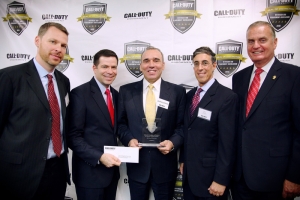Military Social Work Center Wins National Award for Work with Veterans
November 08, 2013 / by Claudia Bustamante- Giving
- Research
The USC Center for Innovation and Research on Veterans & Military Families (CIR) was one of seven organizations to be awarded the inaugural Seal of Distinction by the Call of Duty Endowment Thursday for its efforts at helping transitioning veterans gain meaningful employment.
The Seal of Distinction comes with a $30,000 unrestricted grant and potential for larger grants by the endowment.
“It is an honor to receive the Activision Call of Duty Endowment Seal of Distinction because it recognizes our commitment to helping veterans develop the skills that will enable them to succeed in the workplace and connecting them with career opportunities to serve their fellow veterans,” said Anthony Hassan, director of CIR and clinical associate professor with the USC School of Social Work.
“The nation faces a critical shortage of behavioral health professionals, especially those qualified to care for our veterans and their families. One of our goals is to train a behavioral health workforce that can handle the demand for behavioral health services among our veterans, and I can’t think of a better way to do that than to prepare our veterans for a career in military social work,” he added.
The USC School of Social Work, where CIR is housed, consistently ranks among the nation’s top accredited social work graduate programs and was the first research university to offer a military social work program. CIR informs the curriculum for the Military Social Work and Veteran Services sub-concentration. Many veterans who have graduated with the military sub-concentration have gone on to meaningful careers in areas where they are better equipped to help those veterans coming behind them.
CIR’s work also extends into workplace training to help employers appreciate the value of a veteran worker by increasing the military cultural competency among human resource personnel and hiring managers. Despite an outpouring of goodwill, a cultural divide still exists between military and civilian worlds. CIR’s work in this field is invaluable to helping battle misperceptions that can create barriers to veterans securing gainful employment.
The Seal of Distinction was created in 2013 to highlight those private nonprofit organizations that prove to be most effective at helping veterans secure meaningful employment. Despite recent efforts, the jobless rate among post-9/11 veterans remains stubbornly high. According to the U.S. Bureau of Labor Statistics, in October 2013, the unemployment rate for this population was 10 percent, more than 3 percentage points higher than the national rate.
“The reality is that our youngest veterans continue to face a much higher unemployment rate than their non-veteran peers,” said Dan Goldenberg, executive director of the Call of Duty Endowment. "We are proud to be recognizing those organizations best-equipped at helping place these veterans in jobs, while shining a bright light on the benefits of hiring veterans."
The other awardees were Corporate America Supports You, Easter Seals of Great Washington-Baltimore Region, Salvation Army Haven, United States Veterans Initiative, Veterans Inc., and The Weingart Center. Earlier this year, four other organizations were also recognized: AMVETS, Hire Heroes USA, The Chamber Foundation’s Hiring Our Heroes, and Still Serving Veterans.
The Call of Duty Endowment (www.callofdutyendowment.org) is a non-profit, public benefit corporation conceived by Bobby Kotick, CEO of Activision Blizzard. The organization seeks to help organizations that provide job placement and training services for veterans.
The Center for Innovation and Research on Veterans & Military Families (cir.usc.edu) promotes the health and well-being of service members, veterans and military families through research, education and outreach that encourages successful transitions to civilian life. Among our priorities are rapidly increasing the number of behavioral health providers trained to treat the challenges veterans and their families face, as well as mental health research that can be translated into clinical practice.
To reference the work of our faculty online, we ask that you directly quote their work where possible and attribute it to "FACULTY NAME, a professor in the USC Suzanne Dworak-Peck School of Social Work” (LINK: https://dworakpeck.usc.edu)
